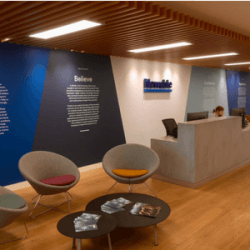October 23, 2018
Technical, social and legal challenges to deployment of wearables in buildings

While there is substantial potential for the deployment of wearables there are also significant technical, social and legal challenges. This is the conclusion of the latest white paper from BSRIA, ‘Wearables & wellbeing in buildings – the story so far’ which found little evidence of any practical solutions linking wearables to HVAC or building systems in general that were already in operation, apart from in “niche areas” such as wearable security fobs. A wearable is a device or an item of clothing which can be worn by a human, or possibly be carried as an implant, which has a degree of “intelligence” built into it and can potentially communicate with the Internet of Things (IoT), either directly or indirectly, for example via a Bluetooth connection to a smart phone. (more…)












 Despite political and economic uncertainly and the aftermath of the global monetary crisis in 2008, London remains a leading global financial centre, with nearly a quarter (24 percent) of the capital’s office take-up attributed to banking and finance occupiers over the last ten years. London is by far the most active banking centre in Europe, according to the latest research from global real estate advisor CBRE. According to the report, 1.1 million people were employed in the UK financial services sector in 2017, of which 34 percent were in London.
Despite political and economic uncertainly and the aftermath of the global monetary crisis in 2008, London remains a leading global financial centre, with nearly a quarter (24 percent) of the capital’s office take-up attributed to banking and finance occupiers over the last ten years. London is by far the most active banking centre in Europe, according to the latest research from global real estate advisor CBRE. According to the report, 1.1 million people were employed in the UK financial services sector in 2017, of which 34 percent were in London. 


 Under half (47 percent) of British managers ‘completely agree’ that they would recommend their workplace to others, lagging behind other countries, such as Austria (66 percent), Finland (53 percent), Switzerland (53 percent), and France (51 percent). This is according to a Cornerstone OnDemand and IDC survey of over 1,900 European HR, IT and line of business managers,
Under half (47 percent) of British managers ‘completely agree’ that they would recommend their workplace to others, lagging behind other countries, such as Austria (66 percent), Finland (53 percent), Switzerland (53 percent), and France (51 percent). This is according to a Cornerstone OnDemand and IDC survey of over 1,900 European HR, IT and line of business managers, 


 The new northern home of the BBC is giving London a run for its money when it comes to siting offices for the UK’s top tech talent, with Manchester leading the way, according to
The new northern home of the BBC is giving London a run for its money when it comes to siting offices for the UK’s top tech talent, with Manchester leading the way, according to 














October 15, 2018
Some thoughts on the addictive power of workplace design
by Agustin Chevez • Comment, Workplace design
(more…)